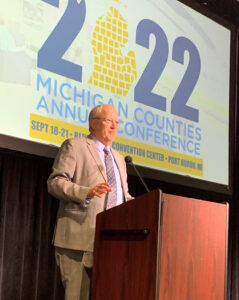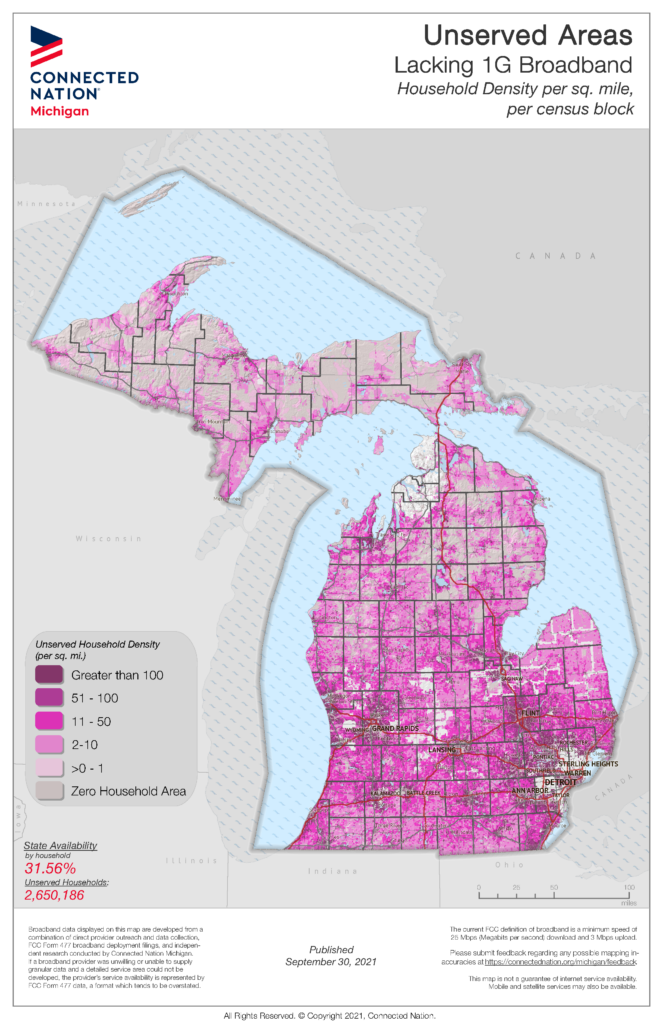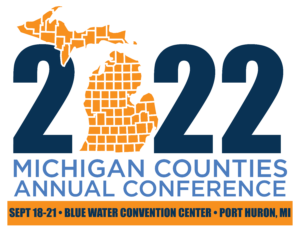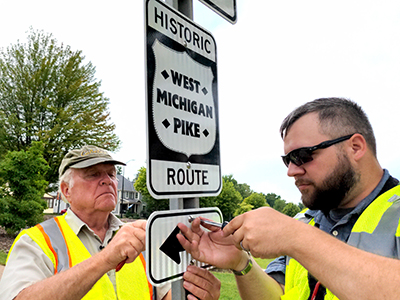House approves extension for trial court funding
 Michigan trial courts would continue to have the authority to impose fees, a critical funding element, until May 1, 2024, under House Bill 5956, a MAC-backed bill approved in the House on Wednesday.
Michigan trial courts would continue to have the authority to impose fees, a critical funding element, until May 1, 2024, under House Bill 5956, a MAC-backed bill approved in the House on Wednesday.
The bill is expected to be approved by the Senate on Wednesday, Sept. 28, and it must be signed by Gov. Gretchen Whitmer prior to Oct. 1 to avoid a disruption in fee authority.
HB 5956, by Rep. Sarah Lightner (R-Jackson), was designed to address the crisis caused by the looming expiration of fee authority on Oct. 1. Courts have long relied on fees to help fund operations. In 2014, the Michigan Supreme Court said, however, that courts could levy only fees specifically designated by the Legislature. MAC led a coalition to enact a legislative fix that was adopted in the fall. That legislation, to place “reasonably related” costs, has been extended twice already.
MAC thanks members who have reached out to their legislators, either directly or via MAC’s digital advocacy tool, in support of court funding.
For more information on this issue, contact Samantha Gibson at gibson@micounties.org.
Permanent fund for road patrol clears Legislature
 A permanent funding source for Secondary Road Patrol needs only the governor’s signature to become reality after the Senate approved enabling legislation this week.
A permanent funding source for Secondary Road Patrol needs only the governor’s signature to become reality after the Senate approved enabling legislation this week.
House Bills 5732 and 5772, by Reps. Tommy Brann (R-Kent) and David Martin (R-Genesee), would allocate $15 million annually for the program from the excise tax on liquor. HB 5773, by Rep. Mike Mueller (R-Genesee), was introduced to eliminate the $10 fee on traffic tickets that has funded Secondary Road Patrol, but the bill did not receive support in the Senate. We anticipate the fee will remain in place and revenue will be redirected to another source.
The changes brought by these bills will eliminate the fluctuations in funding based on the number of tickets issued in a given year, which created uncertainty for law enforcement and rural communities.
HBs 5732 and 5772 will now be presented to the governor for signature. This stable annual funding is a big win for county sheriffs that will allow them to better patrol secondary roads and protect rural communities.
For more information on this issue, contact Madeline Fata at fata@micounties.org.
Commissioners from Clinton, Macomb and Oakland counties elected to MAC Board of Directors; Kent’s Ponstein becomes 114th Board president

Stan Ponstein of Kent County gives his inaugural address during the President’s Banquet on Sept. 20 at the 2022 Annual Conference.
During regional caucuses held at the Michigan Counties Annual Conference Sept. 18-20 in Port Huron, MAC members elected three new members to the MAC Board of Directors and re-elected two incumbents.
The newest members of the 16-member governing body are:
- Ken Mitchell of Clinton County
- Antoinette Wallace of Macomb County
- William Miller of Oakland County
Returning to the MAC Board for another three-year term are incumbent directors Vaughn Begick of Bay County and Scott Noesen of Midland County. Board members can serve a maximum of three 3-year terms.
Leading the Board will be Stan Ponstein of Kent County, who was sworn in as MAC’s 114th Board president during a ceremony on Tuesday, Sept. 20 at the Blue Water Convention Center in St. Clair County.
Joining Ponstein as Board officers for the 2022-23 term are Eileen Kowall of Oakland County (first vice president) and Jim Storey of Allegan County (second vice president).
On Sept. 20, during their Annual Business Meeting, MAC members approved policy platforms developed by MAC’s policy committees overseeing issue areas ranging from finance to agriculture and tourism.
“St. Clair County and Port Huron were excellent hosts for us” said Stephan W. Currie, MAC’s executive director. “It is important as a statewide organization to visit and support all sections of the state, so we were pleased to be able to convene in the Thumb.”
MAC will be posting the presentations from the sessions and photos from the event to www.micounties.org during the week of Sept. 26.
MAC’s 2023 Annual Conference will be Oct. 1-4 in Kalamazoo County.
House approves County Veteran Service Fund requirement changes
 The County Veteran Service Fund, established by the Legislature in 2018, was created to encourage counties to establish and maintain County Veteran Service Offices. The fund ensures that counties are eligible for a $50,000 grant annually, plus additional funding based on the number of veterans living within the county.
The County Veteran Service Fund, established by the Legislature in 2018, was created to encourage counties to establish and maintain County Veteran Service Offices. The fund ensures that counties are eligible for a $50,000 grant annually, plus additional funding based on the number of veterans living within the county.
House Bill 6377, by Rep. Roger Hauck (R-Isabella), was approved in the House on Wednesday, to modify the distribution structure of the County Veteran Service Fund.
Under HB 6377, counties must maintain a minimum county veteran service funding level of 70 percent of the funding level from FY 2017 in order to receive the $50,000 grant from the County Veteran Service Fund. The 70 percent funding level requirement was previously only for FYs 2021 and 2022, however, HB 6377 extends the requirement to FY 2023 and beyond.
The bill now moves to the Senate. MAC is neutral on the bill.
For more information on this issue, contact Samantha Gibson at gibson@micounties.org.
 Join NACo on Sept. 23 for broadband mapping update
Join NACo on Sept. 23 for broadband mapping update
Join NACo staff and the Federal Communications Commission’s (FCC) Broadband Data Task Force (BDTF) on a webinar on Sept. 23 at 2 p.m. (Eastern) for an overview of the ongoing Broadband Data Collection process, which will be used to create an updated national broadband availability map.
The forthcoming broadband availability maps will be instrumental in determining the flow of funds for over $42 billion in funds for broadband deployment from the Bipartisan Infrastructure Law (BIL).
On Sept. 15, the FCC announced the process for state, local and Tribal governments to file bulk challenges to the data in the Broadband Serviceable Location Fabric (the “Fabric”), which serves as the foundation for the Broadband Data Collection (BDC) fixed availability maps. Counties will be able to challenge broadband availability data within the FCC’s national maps, if necessary, following their release this November.
To register for the webinar, click here.
 Staff picks
Staff picks
- New resources on Michigan’s natural freshwater phenomena now available (Michigan Department of Environment, Great Lakes and Energy)
- Tackling the toddler vaccination rate decline (Citizens Research Council of Michigan)
- Abandoned cars cause crime, not just blight (Governing)
- Trail of slime leads German customs to bags of giant snails (Associated Press)

 The installation of Kent County’s Stan Ponstein as MAC’s 114th Board President is one of many highlights planned for the 2022 Michigan Counties Annual Conference, which begins Sunday, Sept. 18 in St. Clair County.
The installation of Kent County’s Stan Ponstein as MAC’s 114th Board President is one of many highlights planned for the 2022 Michigan Counties Annual Conference, which begins Sunday, Sept. 18 in St. Clair County.

 MAC offices will close for conference
MAC offices will close for conference
 Counties will soon receive their first payment from the national Opioid Distributor Settlement. On Sept. 7, the notice regarding Payment 1 of the
Counties will soon receive their first payment from the national Opioid Distributor Settlement. On Sept. 7, the notice regarding Payment 1 of the  Legislation to create an optional structure for the taxes levied on solar facilities in Michigan received a hearing this week before the Senate Committee on Energy and Technology.
Legislation to create an optional structure for the taxes levied on solar facilities in Michigan received a hearing this week before the Senate Committee on Energy and Technology. Applications are now open for another round of funding for rural broadband through U.S. Department of Agriculture’s Rural Utility Service program, ReConnect.
Applications are now open for another round of funding for rural broadband through U.S. Department of Agriculture’s Rural Utility Service program, ReConnect. 
 MAC’s Podcast 83 returned from its summer hiatus with an expanded team this week as newly hired Governmental Affairs Associates Madeline Fata and Samantha Gibson joined the broadcast with Executive Director Stephan Currie and Governmental Affairs Director Deena Bosworth.
MAC’s Podcast 83 returned from its summer hiatus with an expanded team this week as newly hired Governmental Affairs Associates Madeline Fata and Samantha Gibson joined the broadcast with Executive Director Stephan Currie and Governmental Affairs Director Deena Bosworth. Join the National Association of Counties (NACo) on Aug. 31, from 3 p.m. to 4 p.m. (Eastern), for a webinar updating the latest news on the national opioid settlement.
Join the National Association of Counties (NACo) on Aug. 31, from 3 p.m. to 4 p.m. (Eastern), for a webinar updating the latest news on the national opioid settlement.

 Join the 1,710 county leaders already benefiting from the effectiveness of the
Join the 1,710 county leaders already benefiting from the effectiveness of the 





